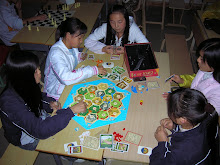...I'm studying Chinese?
This was a trick question. Or, at least, it doesn't have one clear answer. Generally I get strange looks from them. Sometimes I get a laugh. I get one of those there-is-no-way-you-could-possibly-learn-Chinese-it's-way-too-difficult kinds of laughs. Or I get the same thing as a skeptical, but curious scrunched up face: "really? Let me see those flashcards!" as they shuffle through looking for the most difficult characters. "What about this one?" they ask.
"fu." I say.
"But what does it MEAN?" they ask.
"government." I respond.
"No, government OFFICE." they correct me gleefully.
What exactly is this? I don't know. But I see it often. I can do the smallest thing, but if it doesn't fit into the proper tradition, I will be corrected. Sometimes I drink tea too quickly, or I write my question marks incorrectly, or I walk on the wrong side of the street, or I do something which doesn't matter except for the fact that it is new and different - but it is wrong and I will be informed.
Growing tired of this (can't you tell?) I have begun to ask questions and challenge students as they use tradition for justification of trivialities. I try to get them to open their minds and think a little more freely. And I share with them what then becomes a cultural revelation: Americans don't like to hear about every little thing they have done wrong, especially when you don't provide any evidence that your method is any better than theirs. I hope I am truly speaking for Americans here and not only justifying my frustration with the constant correction.
Most Chinese people are very happy to receive direct feedback about being wrong. In fact, criticism is seen in Chinese culture to be motivating and healthy. Chinese students mostly want to know that they are wrong and how to improve. This fact, blended with trusting authority and textbooks, makes for people who are more than willing to help you out when you foolishly bring 12 ounces of coffee to class instead of 6 ("It's bad for your health, you know!").
As for the language learning, I think people are genuinely surprised whenever a foreigner is interested in learning Chinese (especially in rural China). But I won't expect any pats on the back or way-to-gos any time soon (if ever). I will continue studying and listening in on the very interesting Chinese conversations about the foreigner on the bus. Looking around, I realize that this foreigner must be me. "Don't worry, he doesn't understand." one says to the other, mid-conversation.
"Are you sure?" I ask in Chinese. "Maybe my Chinese isn't so bad." I live for these moments.
12.22.2007
Subscribe to:
Post Comments (Atom)








2 comments:
Amen, Dustin. Remember, if you haven't got your Chinese health, you haven't got anything. Is American health different from Chinese health?
Alison and Nick
seriously though, how many characters do you know?
*your answer goes here*
that's too few. you should study harder.
Post a Comment